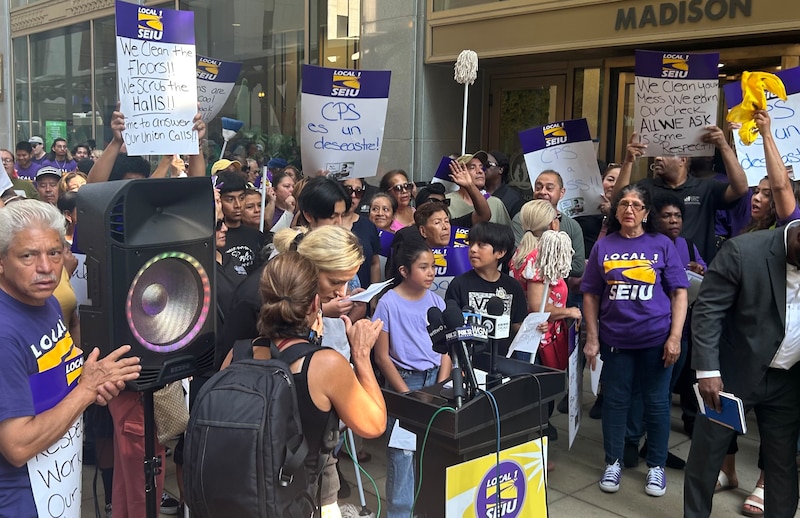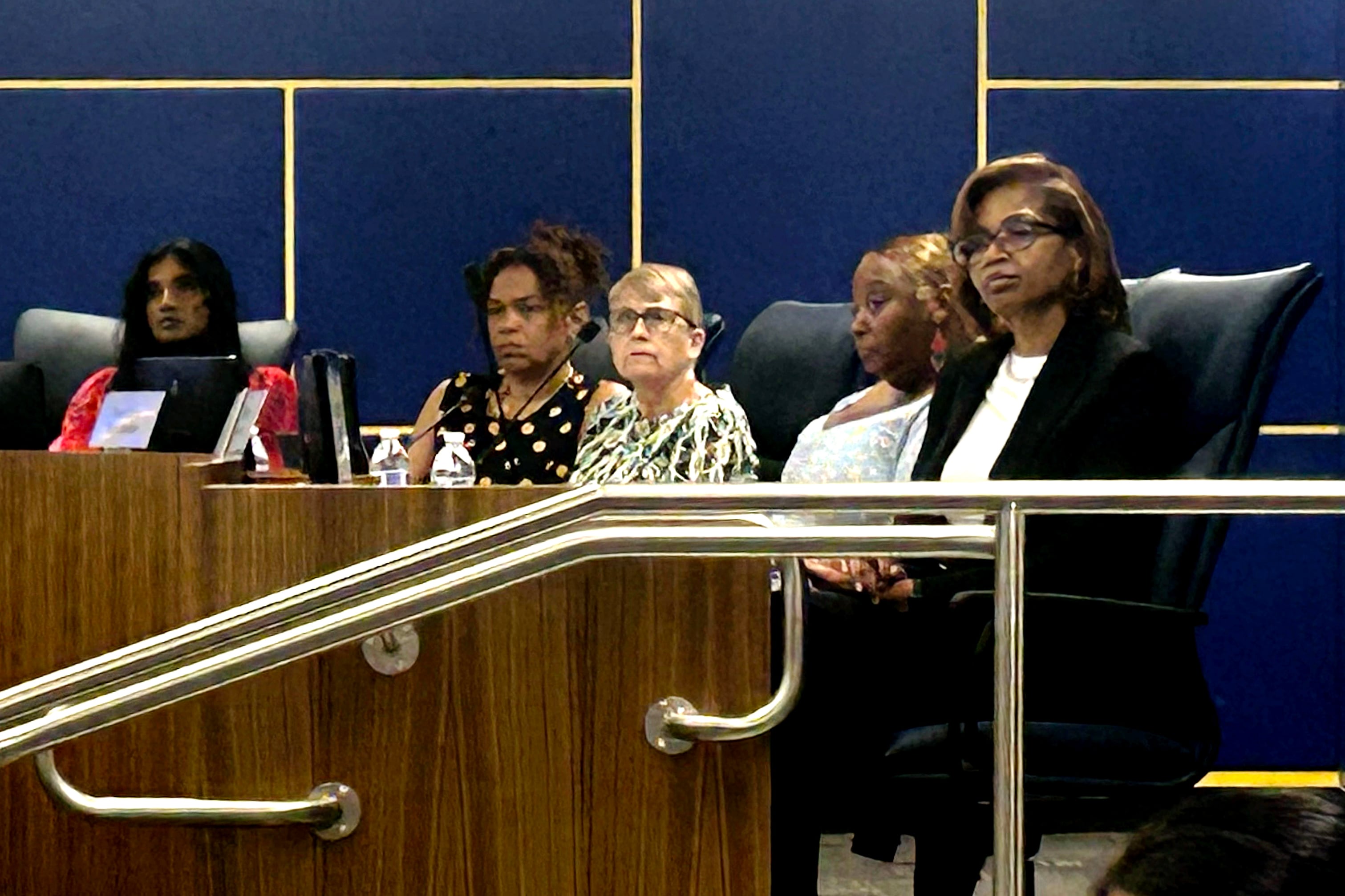Sign up for Chalkbeat Chicago’s free daily newsletter to keep up with the latest education news.
Chicago school board members clashed over a controversial payment to a city pension fund as they weighed in on the district’s $10.2 billion budget proposal unveiled for the first time Wednesday.
The budget, which covers the 2025-26 school year, was delayed well past the July 1 start of the fiscal year due to former CEO Pedro Martinez’ departure earlier this summer and efforts to close a gaping $734 million budget deficit.
Interim CEO Macquline King, a former mayor’s office employee, put forward the spending plan, which the 21-member school board must approve by the end of the month. It does not include a reimbursement to the city for the $175 million payment to a pension fund covering non-teaching CPS staff along with city employees — though unlike last year’s budget, it sets a goal of making the payment in case of an unexpected influx of funding. The proposal also does not involve taking out a short-term, high-interest loan to balance the budget, an idea the mayor’s office has previously championed.
The budget proposal assumes CPS would get $379 million from a city pool of taxpayer dollars for economic development, known as surplus Tax Increment Financing, or TIF, dollars — an uncertain proposition at a time when the city faces its own budgetary woes.
A number of school board members — primarily those appointed by the mayor — sharply criticized the decision not to budget for the pension payment. They argued that this move would alienate the city and mayor’s office and endanger the likelihood that CPS will get more TIF surplus funding. A couple members brought up the possibility of borrowing, including specifically to make the pension reimbursement.
“If we’re going to act like we don’t care about the city budget,” Michilla Blaise, one of the 11 Johnson-appointed members, said, “why should they care about ours?”
But other members praised district officials for presenting a balanced budget that does not include staff furloughs or cuts directly affecting the classroom. They said making the pension payment would translate into painful budget cuts, while taking out a loan would mean steep interest and other costs at a time when CPS already pays $1.06 billion a year to service its debt.
“Why would the education mayor come down and shake CPS down for $175 million?” said elected member Angel Gutierrez, noting Johnson’s transition team urged him not to saddle CPS with the payment. “It just doesn’t make any sense to me.”
The budget proposal reflects a total of $272 million in cuts, including to the district’s central office staff as well as custodial services, crossing guards, cafeteria staff, and more. Before Wednesday’s board meeting, SEIU Local 1, the union that represents some district custodians, held a protest against job cuts affecting its members. Custodians held mops and chanted “Keep schools clean” in front of district headquarters and decried the cuts, which they said blindsided their union and will result in dirtier school buildings.

District officials outlined steps to close the deficit
The district will host two budget forums to get input from the public on at 1 p.m. and 4:30 p.m. Aug. 19 at district headquarters, at 42 W. Madison St. The board is slated to vote on the budget proposal at its Aug. 28 regular meeting.
Earlier this summer, King estimated the budget deficit at $734 million, factoring in the pension payment to the city. Her predecessor, Martinez, whose refusal to make the pension reimbursement or take out a short-term, high-interest loan contributed to his firing, left out the payment and sent local schools their budgets assuming a best-case scenario deficit of $299 million that also included an influx of city tax dollars.
At the Wednesday meeting, the district’s chief budget officer Mike Sitkowski said the proposal was informed by input from residents who urged the district to protect classroom instruction, resist more high-cost borrowing for operating costs, and forego the city pension reimbursement. The district is taking on $2.4 billion in new long-term debt to pay for maintenance of its aging school buildings. The new budget proposal includes $556 million in capital expenses.
In addition to the cuts, Sitkowski explained that officials closed this year’s budget gap thanks to an unexpected increase in state funding, a refinancing of some district debt in a way that ensures longer-term savings, and a decision to dip into a “rainy day fund” set aside specifically to help make debt payments, among other means. He said this year’s budget will mean a smaller budget deficit for the 2026-27 year, though it remains significant at $520 million.
“This budget fully protects our school buildings,” Sitkowski said. “It avoids the risk of beginning-of-year or midyear cuts to schools.”
Some school board members hailed King’s proposal for resisting the pressure to take on the pension payment to the city. District leaders said CPS aims to make that payment if it receives more than the tax surplus dollars it’s requesting — or if the state comes through with extra funding. The city is on the hook for the payment under state law and has made it historically, but Johnson has argued the district should take it on as it moves away from mayoral control and toward a fully elected school board in 2027.
“This budget does really center the kids and protect our schools,” said elected board member Jessica Biggs.
But other board members echoed the mayor’s argument that it’s time for the district to take responsibility for these retiree costs and voiced concern about some of the recent budget cuts. Some said they worried that if the city doesn’t come through with the TIF surplus revenue the district is budgeting, that would mean disruptive midyear budget cuts or furloughs.
“I just don’t think this really is a balanced budget, and I’m very concerned,” said member Olga Bautista, another Johnson appointee.
Board members asked if city officials have weighed in
This week, district, mayor’s office, and labor leaders made another push for more state funding in a series of closed-door briefings with state lawmakers and Chicago aldermen. That’s even though Illinois legislators and Gov. JB Pritzker have repeatedly signaled they don’t think the state is in a position to steer more dollars to the district.
Some board members pressed King and other officials on what city leaders have signalled about their own appetite for steering more money to CPS, but officials demurred, saying they first wanted to present the budget to the school board.
“The question did come up, but I wasn’t going to get ahead of the budget,” said King, who otherwise deferred to Sitkowski to present the budget and field board member questions.
The district announced earlier this month that it will end its custodial contracts with private companies and bring some of those positions in-house, resulting in a net loss of 480 janitor jobs. District officials have said that bringing oversight of the remaining 2,100 custodians entirely under district purview would result in cleaner buildings, even with considerably fewer custodians.
Union leaders and custodians said the affected employees got little notice and have to reapply for their jobs, losing seniority and potentially their current pay. They voiced skepticism that the remaining custodians can handle cleaning the district’s schools.
District officials stressed Wednesday that their proposed budget fulfills all obligations under recent labor contracts, including the Chicago Teachers Union contract approved earlier this year, which added about $1.5 billion in additional staffing and compensation costs over four years.
During public comment, CTU officials again called on the board to redouble efforts to advocate with the state, highlighting a roughly $4,000 per student gap between what the state estimates would be adequate funding for CPS and what the district now receives from the state. Jackson Potter, the union’s vice president, said the CTU opposes cuts to crossing guard, custodian, and special education classroom assistant positions.
Potter also said CPS should permanently take on some of the cost of the municipal pensions since many of the covered employees work for the school district. He said making sure those pensions are funded is “an obligation” and “not a hot potato to be thrown around by CPS or the city.”
Correction: An earlier version of this story misstated the deficit amount that the administration of former CEO Pedro Martinez used to craft school budgets earlier this year.
Mila Koumpilova is Chalkbeat Chicago’s senior reporter covering Chicago Public Schools. Contact Mila at mkoumpilova@chalkbeat.org.






